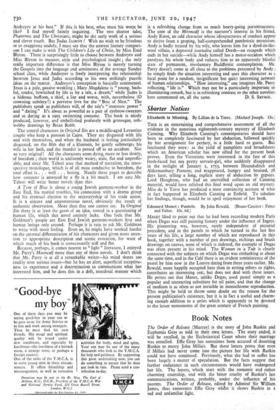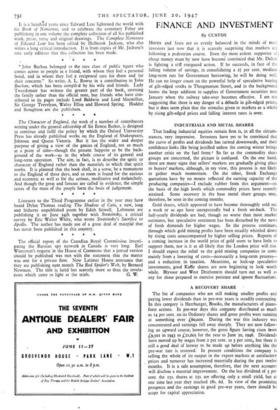Book Notes The Order of Release (Murray) is the story
of John Ruskin and Euphemia Gray as told in their own letters. The story ended; it will be recalled, in- the Ecclesiastical Court where their marriage was annulled. Effie Gray has sometimes been accused of deserting Ruskin to marry John Millais. But these letters prove that even if Millais had never come into the picture her life with Ruskin could not have continued. Previously, what she had to suffer has been largely a matter of speculation. But the facts suggest that further endurance in such circumstances would have endangered her life. The letters, which start with the romantic and rather charming courtship, end with the bitter cruelty of Ruskin's last communications, written, probably, under the influence of his parents. The Order of Release, edited by Admiral Sir William James, thus exonerates Effie -Gray whilst it shows Ruskin in a sad and unfamiliar light.
It is a hundred years since Edward Lear lightened the world with his Book of Nonsense, and to celebrate the centenary Faber are publishing in one volume the complete collection of all his published work, prose, verse and original drawings. The Complete Nonsense of Edward Lear has been edited by Holbrook Jackson, who also writes a long critical introduction. It is from copies of Mr. Jackson's rare early editions that this collection has been made.
* * " John Buchan belonged to the rare class of public hgure who comes across to people as a friend, with whom they feel a personal bond, and in whom they feel a reciprocal care for them and for their concerns." So writes A. L. Rowse in a contribution to John Buchan, which has been compiled by his wife and friends. Lady Tweedsmuir has written the greater part of the book,, stressing the family rather than the official note, but friends who have con- tributed to its pages include Lord Baldwin and Lord Macmillan, Sir George Trevelyan, Walter Elliot and Howard Spring. Hodder and Stoughton are the publishers.
* * * * The Character of England, the work of a number of contributors writing under the general editorship of Sir Ernest Barker, is designed to continue and fulfil the policy by which the Oxford University Press has already published works on the England of Shakespeare, Johnson and Queen Victoria. But it has the wider and deeper purpose of giving a view of the genius of England, not so much at a point of time—though the present happens to be the back- ground of the work—as in the whole course of its general and long-term operation. The aim in fact, is to describe the spirit or character of England rather than the materials in which that spirit works. It is planned that the book shall, in a sense, be a monument to the England of these days, and so room is found for the curious and eccentric as well as for the serious, meditative and melancholy. And though the great and famous are called in evidence, the simple tastes of the mass of the people form the basis of judgement.
* * * * Listeners to the Third Programme earlier in the year may have heard Dylan Thomas reading The Shadow of Cain, a new, long and hitherto unpublished poem by Edith Sitwell. Lehmann are publishing it on June 24th together with Stravinsky, a critical survey by Eric Walter White, who wrote Stravinsky's Sacrifice to Apollo. The author has made use of a great deal of material that has never been published in this country.
* * * * The official report of the Canadian Royal Commission investi- gating the .Russian spy network in Canada is very long. Earl Winterton's request in the House of Commons that a potted version should be published was met with the statement that the matter was one for a private firm. Now Latimer House announce that they are publishing next month The Red Spider's Web, by Bernard Newman. The title is lurid but scarcely more so than the revela-



































 Previous page
Previous page